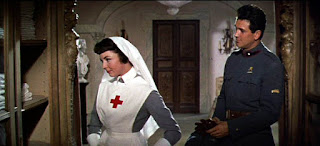Tuesday, 8 August 2017
Movie Review: A Farewell To Arms (1957)
A grand romantic drama set against the backdrop of war, A Farewell To Arms enjoys some salient moments but also gets bogged down in arduous prolonged on-location padding.
The setting is the Great War, in northern Italy. Frederick Henry (Rock Hudson) is a well-liked American who has volunteered as an ambulance driver in the Italian Army. His close friend Major Alessandro Rinaldi (Vittorio De Sica) introduces him to the newly arrived British nurse Catherine Barkley (Jennifer Jones). Frederick and Catherine immediately hit it off, but their nascent relationship is interrupted when the Italian Army starts an offensive across the Alps and Frederick is called into action.
He sustains a knee injury which necessitates a long period of rehabilitation at an American-run hospital, and an opportunity to resume the illicit affair with Catherine and cultivate a deep love, culminating in pregnancy. They discuss getting married, but that would force Catherine back to Britain as married nurses are not allowed to serve. When Frederick is sufficiently healed, grouchy nurse Van Campen (Mercedes McCambridge) releases him back into service, forcing another separation. This time the Italian Army is routed, and Frederick experiences the worst horrors of war.
An adaptation of the Ernest Hemingway novel directed by Charles Vidor, A Farewell To Arms was producer David O. Selznick's final attempt to create an epic at the success scale of Gone With The Wind. Hollywood's second kick at the story after a 1932 effort starring Gary Cooper and Helen Hayes, this version is a sometimes plodding CinemaScope affair, inordinately self-satisfied with scenery and location shooting. Working from a Ben Hecht script, Vidor (who replaced John Huston) botches the pacing, and long stretches of the film's 152 minutes appear to be little more than an excuse for adding yet more European vistas.
On the positive side there is plenty of adventurous material on display to generate intrigue and controversy. The film takes on some difficult topics, including sex and pregnancy outside of marriage circa 1917, defeated armies turning upon themselves, and the silent tragedy of both civilians and soldiers exposed to war's brutality. Vidor does not shy away from gore, and his best sequence is a mammoth, near-silent retreat, as defeated, exhausted and emotionally spent men, women and children trudge through the mud to escape death or welcome it. And through the character of Major Rinaldi, a grizzled army veteran, the mind-bending mental strain of the conflict is also explored.
And some of the wide-screen scenery is a joy to behold. The sight of the Italian Army columns on the move along the steep switchbacks of the Alps towards the Austrian front lines is fine cinematic craftsmanship.
While these highlights are welcome and often sparkle, the central romance eventually dominates the film entirely. Long stretches of the second half are exclusively centered on Frederick and Catherine, either joyously in love or confronting the consequences of their actions. Both the war and all the secondary characters disappear, and the two lovers predictably wilt under the pressure of carrying an epic.
Rock Hudson and Jennifer Jones are passable without ever setting the screen alight. Hudson operates within a fairly narrow range on either side of bland. Jones is more interesting, and allows hints of her character's fragility to sneak out through sheer insistence on being a perfect, almost subservient partner.
Ambitious but unbalanced, A Farewell To Arms has love leaving war behind, but unfortunately also losing its edge in the process.
All Ace Black Blog Movie Reviews are here.
Labels:
Jennifer Jones,
Rock Hudson,
Vittorio De Sica
Subscribe to:
Post Comments (Atom)















No comments:
Post a Comment
We welcome reader comments about this post.